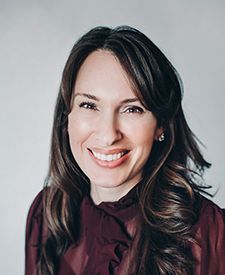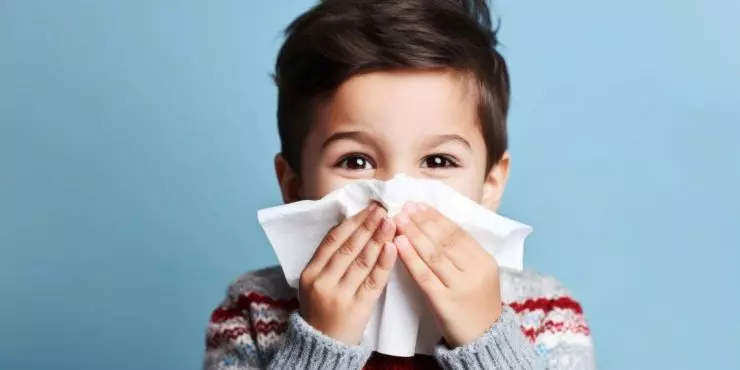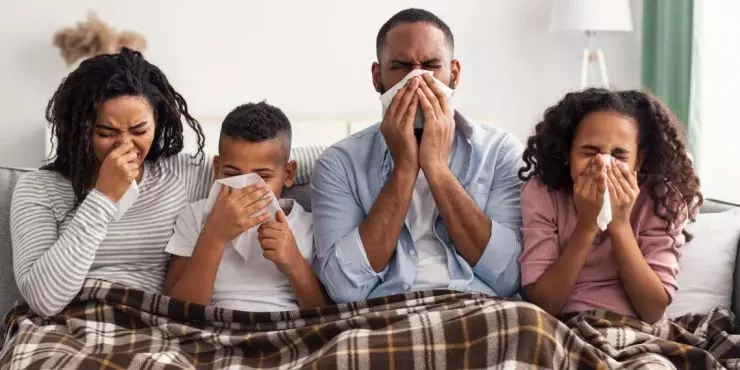

By: Dr. Jennifer Purifoy, DO, MPH
As a mom and a physician, I know how concerning it can be when our little ones (or even us grown-ups!) get sick. Let's talk about Respiratory Syncytial Virus, or RSV. It's a really common respiratory virus that often feels just like a cold. Most healthy folks bounce back in a week or two, but for our tiniest babies, older adults, and anyone with underlying heart, lung, or immune conditions, RSV can unfortunately lead to more serious breathing issues. Here in Minnesota, we typically see RSV activity pick up in the fall and peak in the winter, so having a good plan for prevention and care can make the season much smoother for your whole family.
How is RSV Spread and How Long it Lasts

RSV primarily infects the nose, throat, and lungs. It spreads easily through those tiny droplets from coughs and sneezes, and also by touching surfaces that have the virus on them and then touching your eyes, nose, or mouth. Generally, people are contagious for about 3 to 8 days, but it's good to know that infants and those with weakened immune systems can sometimes spread the virus for a bit longer.
RSV Symptoms
Most RSV infections start off feeling a lot like a common cold. You might notice some typical symptoms like:
- A runny or stuffy nose
- Sneezing and a mild cough or sore throat
- A low-grade fever and perhaps a decreased appetite
- Feeling a bit more tired than usual
However, it's really important to be aware of the signs that could indicate a more serious infection. Please keep an eye out for:
- Fast breathing, or if your child (or you!) seems to be working hard to breathe. This might look like their belly pulling in, their ribs or collarbones showing with each breath, flaring nostrils, or making grunting sounds.
- A blue or pale color around the lips or face.
- Signs of dehydration, such as a dry mouth, crying without tears, or fewer wet diapers/urinations than usual.
- Lethargy, unusual sleepiness, or confusion.
- Chest pain, a persistent high fever, or symptoms that seemed to get better but are now worsening.
If you notice any of these more serious symptoms, please don't hesitate to reach out to your doctor right away. We're here to help guide you on the best next steps for your family.
How RSV Looks at Different Ages

Infants Under 12 Months (especially under 6 months)
Our littlest ones might show subtle signs at first, like feeding less, sleeping more, being unusually irritable, or even having brief pauses in their breathing. RSV can sometimes progress to bronchiolitis, which is an inflammation of those tiny airways, leading to excess mucus production, wheezing, and trouble breathing.
What you can do at home:
- Gentle saline drops and nasal suction before feeds and sleep can really help clear those tiny noses.
- Offer smaller, more frequent feeds to make sure they stay hydrated.
- A cool-mist humidifier and keeping them upright while awake can also provide comfort.
- Dress them in light layers; we don't want them to overheat.
When to call your doctor promptly:
-
If your baby has any breathing difficulty, fewer than 3 wet diapers in 24 hours, can’t keep feeds down, or is under 3 months with a rectal temperature of 100.4°F or higher.
Toddlers and School-age Kids
For our toddlers and school-age children, you can expect several days of cough and congestion. That night cough is pretty common, and sometimes RSV can even trigger asthma flares.
Home care:
- Plenty of fluids and rest are key. You can use acetaminophen or ibuprofen for comfort (just remember to avoid aspirin in kids).
- Saline sprays or rinses can be helpful for older kids.
- If your child has asthma, keep up with their inhalers and spacers as prescribed. Oral steroids are sometimes necessary due to the virus causing an asthma exacerbation. A child’s asthma action plan can help guide you.
When to call the doctor:
-
If their breathing looks labored, the cough is worsening after day 4–5, fevers persist beyond 3 days, or your child is unusually sleepy or not drinking well.
Teens and Healthy Adults
For teens and healthy adults, RSV usually feels like a typical "bad cold." Rest, fluids, and over-the-counter symptom care are generally all that's needed to get through it.
When to call the doctor:
-
If you experience chest pain, shortness of breath, a high fever, or if you have an underlying condition (like asthma, COPD, heart disease, or immune suppression) and your symptoms are worsening.
Older Adults and People With Chronic Conditions
For older adults and those with chronic conditions, RSV can be more serious, sometimes triggering pneumonia or making existing conditions like asthma, COPD, or heart failure worse.
When to call the doctor:
-
If there’s any shortness of breath beyond your usual baseline, oxygen desaturations <90% (if you use home oximetry), swelling, sudden weight gain, or confusion. Keep up with your action plans and medications as prescribed.
When to Treat at Home vs. When to Seek Care

Treat at home if symptoms are mild and improving
You can comfortably manage things at home if you're seeing congestion, a mild cough, a low-grade fever, normal breathing, and everyone is staying well-hydrated.
Schedule a clinic visit
It’s a good idea to schedule an appointment if symptoms last longer than a week without improvement, you hear wheezing, notice ear pain, or if you or your child has an underlying condition.
Urgent care or ER
Please head to urgent care or the ER right away if there's trouble breathing, retractions (when the skin pulls in around the ribs or collarbones with each breath), grunting sounds, color changes (like blue or pale lips/face), pauses in breathing, signs of dehydration, a persistent high fever, or if an infant under 3 months has a fever of 100.4°F or higher.
Here at Northwest Family Clinics, we offer same- or next-day appointments in Crystal, Plymouth, and Rogers. Just give us a call or click the yellow book an appointment button on our website, and we’ll help you decide the right setting for care—whether it's a clinic visit, urgent care, or the ER.
Testing and Treatment
Most people don’t actually need an RSV test—your provider can often diagnose RSV based on symptoms and a physical exam, especially during peak season. If a test would change treatment or isolation guidance (for our high-risk patients, daycares, or congregate settings), then we may recommend it.
It’s important to remember that there’s no antibiotic for RSV, as it’s a virus. Our care is supportive: focusing on fluids, rest, fever control, saline, suction, and inhalers if there's wheezing. In more severe cases, oxygen or hospital care might be needed.
Prevention: What Actually Helps
Daily steps:
- Wash hands often; teach kids that 20-second soapy scrub!
- Keep fingers away from eyes, nose, and mouth, and be sure to cover coughs and sneezes.
- Disinfect high-touch surfaces and shared devices regularly.
- Stay home when sick, and only return to school or work after your fever is gone for 24 hours without medicine and your symptoms are clearly improving.
- Avoid tobacco and vaping exposure—smoke irritates airways and can make illness worse.
- Encourage outdoor time and good ventilation when the weather allows (even brief, brisk Minnesota walks help!).
Targeted medical prevention tools:
- Maternal RSV vaccine: One dose during late pregnancy (within a specific window in the third trimester) helps protect your newborn for their first few months of life. If you happen to miss that window, your baby can still get protection after birth via infant antibodies.
- Infant RSV preventive antibodies: A single dose given to newborns or young infants at the start of RSV season, or soon after birth, can significantly reduce their risk of hospitalization.
- Older-adult RSV vaccines: Adults 60 and over may be eligible for an RSV vaccine after a shared decision-making discussion with their clinician, especially if they have heart, lung, or immune conditions.
Not sure what applies to your family? We’ll walk you through maternal vaccination, infant antibody timing, and older-adult options based on your due date, your child’s age, and the current Minnesota season.
Specifics When it Comes to Minnesota
Here in Minnesota, RSV activity generally rises in the fall, peaks in winter, and can overlap with influenza and COVID-19. This means that your good prevention habits (like handwashing, staying home when sick, and keeping up with recommended vaccines) actually help protect against more than one virus at a time! If your newborn is due between late summer and winter, please ask us about the best timing for maternal RSV vaccination or infant antibodies based on the current season in the Twin Cities metro and surrounding counties.
Frequently Asked Questions
How long is RSV contagious?
Most people are contagious for 3–8 days, starting a day or two before symptoms appear. Infants and those with weakened immune systems may shed the virus for a bit longer. If you’re still coughing a lot or feel unwell, it’s a good idea to mask around high-risk relatives and keep visits short.
Does my child need an RSV test to return to daycare or school?
Usually no. Most programs follow symptom-based return policies: fever-free for 24 hours without fever-reducing medicine and symptoms improving. Always ask your childcare provider for their specific policy.
What’s the difference between a cold and RSV?
Clinically, they can look pretty similar at first. However, RSV is more likely to cause wheezing or breathing trouble in babies and older adults. If breathing looks labored, please call your clinic regardless of what you think the illness might be.
Can you get RSV more than once?
Yes, you can! Our immunity can wane, so reinfections are common, but they’re usually milder in healthy older kids and adults.
Do air purifiers or humidifiers help?
A cool-mist humidifier can certainly ease congestion and cough in our dry winter air. HEPA purifiers can also help reduce particulate exposure indoors. Just remember to clean these devices regularly to avoid mold buildup.
Should my baby or older parent get the new RSV protection this season?
It really depends on age, timing, and individual health conditions. We’ll help you decide between maternal vaccination in late pregnancy, infant antibodies after birth, and older-adult vaccination options.
When should an infant go to the ER?
Right away for fast or labored breathing, pauses in breathing, a blue or pale color, poor feeding with very few wet diapers, or extreme sleepiness.
Are antibiotics or steroids helpful?
Antibiotics don’t treat viruses like RSV. Steroids may be used in specific situations (for example, if there's known asthma), but they’re not routinely given for RSV bronchiolitis. We always individualize treatment based on a thorough history and exam.
What pain/fever medicine can I use for my child?
Acetaminophen is safe by weight for infants older than a few weeks; ibuprofen can be used in many children 6 months and older. Please avoid aspirin in children. If you’re unsure about dosing, call us—we’ll calculate it based on your child’s weight.
We’re Here for Your Family
Whether you’re expecting a winter baby, have a toddler in daycare, or are caring for an older parent, RSV doesn’t have to derail your season. If you’re seeing worrying symptoms or just need a plan, please call Northwest Family Clinics in Crystal, Plymouth, or Rogers. We’ll help you decide what to do next—and keep you out of the ER when it’s safe to do so.